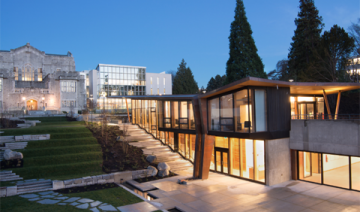Stephen Toope at TRC National Event in Vancouver
Following a conference held in March 2011 by the Truth and Reconciliation Commission of Canada on institutions of memory, the UBC First Nations House of Learning (FNHL) and the Indian Residential School Survivors Society (IRSSS) began discussions about an institution of memory addressing the experiences of survivors of the Indian residential schools on the west coast.
As it neared the completion of its mandate, the Truth and Reconciliation Commission of Canada issued a request for proposals to establish a National Research Centre to be a repository for its records. After much discussion, UBC supported the successful bid of the University of Manitoba to locate the national centre in Winnipeg, with the understanding that UBC would pursue the possibility of establishing a west coast affiliate Centre on its Vancouver campus. When the TRC conducted its final west coast National Event in September 2013, UBC suspended classes for a day and many students and faculty attended the event and, at the end of the day, heard UBC President Stephen Toope announce the university’s intention (see video above).

Indian Residential School History and Dialogue Centre
In its June 2016 meeting the UBC Board of Governors approved the Indian Residential School History and Dialogue Centre (IRSHDC) for construction, and on September 12, 2016, President Santa Ono announced the start of construction.
The Centre, which officially opened on April 9, 2018, is presently being led by Dr. Tricia Logan, Interim Academic Director.
The Centre has been built with several purposes in mind. One is to provide a more accessible place on the west coast for former students and survivors, their families and communities to access their records and other historical material that the TRC and others have gathered, and to have a place to discuss their experiences, the history, and its effects and implications.
Related: UBC apologizes to Indian residential school survivors at centre opening
If you are among the great majority of Canadians who do not know what the Indian residential schools were, why understanding them is so important, and why their effects are still with us today, please click here for further information. You might also want to look at this short article reflecting on two individual experiences.
Another purpose is to provide public information for UBC students and students from other universities and schools, and for visitors who will visit the Centre in person or online. It is still very much the case that many students, and most Canadians and other visitors, have had access to no real information about Indigenous people or the history of the interactions that have shaped our country. We have consistently found, however, that even with introductory information about the residential schools and associated matters, students and others are in a much better position to think about their relationships with Indigenous people and the issues that define our country. There is little question that the deficit in our shared knowledge is an impediment to many necessary conversations and negotiations, and to the progress of our society. With more complete knowledge of history, far more adequate address of contemporary issues is possible.
The Centre will be one very positive way to address this situation.
The IRSHDC is designed to be a history centre, but also a dialogue centre. Much work is currently underway among different units on campus and with Indigenous communities and organizations to address important issues—of Indigenous health, community resiliency, economic development, and many other concerns.
Fundamental questions about history, how it is discussed in schools and communities and in public communications, and how it forms current approaches to common questions, all require further discussion, and not just in conferences and occasional meetings. All of these discussions need to proceed through regular and sustained interactions among many people, and the Centre will be a place for that to happen, and for people to meet and discover common interests.
The Centre will also provide a place to develop advanced curricular materials for classes at UBC and other post-secondary and K-12 institutions, using interactive technology that can be replicated in many other places throughout Canada and elsewhere.
For more information, visit the IRSHDC website.
Updated: November 8, 2023